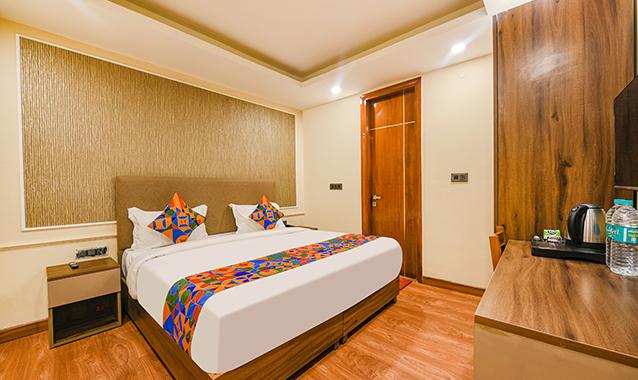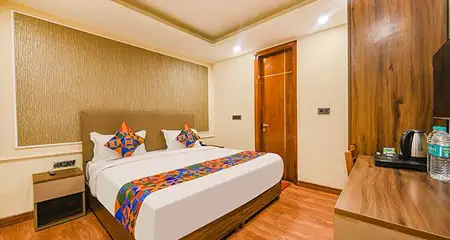When we think of hotels, we often imagine a home away from home—a place where comfort, convenience, and a touch of luxury come together to offer a perfect escape. Hotels come in various forms, each tailored to different tastes, budgets, and purposes. From the opulence of five-star luxury hotels with world-class amenities and personalised services to the charming and intimate settings of boutique hotels that exude local flavour and character, there’s something for everyone. Business travellers often seek the efficiency and convenience of business hotels equipped with meeting rooms and high-speed internet. At the same time, families might opt for family-friendly hotels that offer spacious rooms and kid-friendly activities. In this article, we will discuss different types of hotels, star ratings, and the hospitality industry.
What are the Hotels?
Hotels are more than just places to stay; they are gateways to new experiences, comfort, and memorable moments. Hotels offer a temporary home for travellers, providing a range of accommodations from simple rooms to luxurious suites. Each hotel, regardless of its size or star rating, strives to create a unique atmosphere of comfort for its guests.
What is the Hotel Industry?
The hotel industry is a vibrant and dynamic sector that plays a crucial role in the global economy, providing accommodations, meals, and other services to travellers. The hotel industry is all about hospitality—welcoming guests, ensuring their comfort, and creating memorable experiences. Whether it’s a luxurious five-star resort, a bed and breakfast, or a budget-friendly hotel, the essence of the hotel industry lies in catering to the diverse needs and preferences of the guests. The industry’s scope goes beyond just providing a bed; it encompasses a wide range of services including food and beverage, leisure activities, events, and conferences.
Types of Hotels
When it comes to choosing a place to stay, the types of hotels available can greatly influence your travel experience. From luxury resorts to cosy bed and breakfasts, each type offers a unique ambience and set of amenities tailored to different tastes and needs. Here’s a look at some common types of hotels:
1. Luxury Hotels
These hotels are all about indulgence, offering lavish rooms with high-end furnishings, exceptional service, and a range of amenities like gourmet dining, spa treatments, and private pools. Staying in a luxury hotel often feels like a special occasion in itself, perfect for celebrating milestones or simply pampering oneself.
2. Boutique Hotels
Boutique hotels are small, stylish properties often located in the centre of the city. They stand out for their personalised service. With fewer rooms than larger hotels, boutique hotels offer a more intimate atmosphere and are ideal for travellers who appreciate attention to detail and a personal touch.
3. Business Hotels
Business hotels cater to the needs of corporate travellers, providing amenities such as conference rooms, high-speed internet, and business centres. These hotels are typically located in city centres or near business districts, making them convenient for attending meetings and conferences. The efficient service and comfortable accommodations ensure that business travellers can work and relax with ease.
4. Budget Hotels
Budget hotels offer clean, comfortable accommodations without breaking the bank. These hotels provide the essentials like clean beds, private bathrooms, and basic amenities. Budget hotels are perfect for those who prefer to spend their money on exploring rather than lodging.
5. Bed and Breakfasts
Bed and breakfasts (B&Bs) offer a charming, homely experience, often run by the owners themselves. Guests can enjoy cosy rooms, a hearty homemade breakfast, and the opportunity to meet fellow travellers. B&Bs are ideal for those who enjoy a friendly, community-oriented atmosphere.
6. Resorts
Resorts are all about relaxation and recreation, typically located in scenic destinations like beaches, mountains, or countryside. They offer extensive amenities such as swimming pools, golf courses, multiple dining options, and organised activities. Resorts are perfect for a vacation where the goal is to unwind and enjoy various leisure activities without leaving the property.
7. Couple-Friendly Hotels
Couple-friendly hotels understand the unique needs of couples and strive to create an environment that is welcoming and comfortable. Couple-friendly hotels prioritise safety and respect for privacy. They have policies in place to ensure that all guests feel secure and comfortable. Discreet and professional staff are trained to provide excellent service without intruding on your personal space.
Classification of Hotels based on Star Ratings
The rating of a hotel represents the quality of services they are providing. It usually varies from 1-star which is the lowest to 5-star which is the highest according to the quality, cleanliness and other standards. The hotels with a rating of 1 star are the cheapest staying options that lack even the basic services. In contrast, hotels with 5-star ratings provide luxury stays with world-class facilities. There are some 7-star hotels as well which provide more than exceptional services.
What is a 3-star Hotel?
A 3-star hotel provides a decent staying option with basic amenities on a budget. These hotels provide quality services without making you spend a fortune.
- Price: ₹1500-₹4000
- Facilities: Clean sheets, toiletries, free wifi, TV, air conditioning, parking
- Unique: Basic amenities at budgeted prices
What is a 4-star Hotel?
The 4-star hotels have an upscale comfort and deluxe services. The 4-star hotel offers well-appointed rooms with enhanced amenities, on-site dining options, room service, and various recreational facilities.
- Price: ₹5000-₹12000
- Facilities: Comfortable bedding, spacious rooms, swimming pool, 24X7 concierge, restaurants, in-room dining
- Unique: Comfortable and upscale experience
What is a 5-star Hotel?
A 5-star hotel is a luxury accommodation establishment that provides exceptional levels of comfort, service, and amenities. The designation “5-star” signifies the highest standard of luxury and is associated with a premium and indulgent experience for guests.
- Price: ₹15000-₹50000
- Facilities: World-class facilities like laundry service, stocked mini-bar, free snacks and drinks, comfortable sitting area, luxurious toiletries, swimming pool, 24X7 concierge, restaurants, in-room dining
- Unique: Luxury experience
The Difference Between the Hotel Industry and the Hospitality Industry
The hotel industry is a subset of the hospitality industry, focusing primarily on providing lodging services. Hotels, motels, resorts, and bed-and-breakfast establishments fall under this category. Their primary function is to offer accommodation, ranging from basic rooms to luxurious suites, catering to the needs of travellers, tourists, and business professionals. The services provided in the hotel industry include room service, housekeeping, front desk operations, and amenities such as swimming pools, gyms, and conference facilities. The emphasis here is on creating a comfortable and convenient stay for guests, ensuring their staying needs are met with efficiency and care.
On the other hand, the hospitality industry encompasses a broader spectrum of services aimed at ensuring guest’s overall experience is enjoyable and satisfying. This industry includes hotels, restaurants, cafes, bars, event planning, theme parks, travel and tourism services, and even cruise lines. The essence of hospitality lies in making guests feel welcome and valued, whether they are dining in a restaurant, attending a conference, or enjoying a vacation. Hospitality professionals are dedicated to creating memorable experiences, focusing on customer service, personalised attention, and exceeding expectations.
How to Book Hotels Affordably in 2024
Booking hotels affordably can be an enjoyable experience if you know the right strategies. Here are some tips to help you find great deals on your next stay while ensuring a pleasant and stress-free booking process.
- Start with Online Travel Agencies (OTAs): Online travel agencies often offer competitive prices and allow you to compare various hotels. Look for deals and discounts, and consider signing up for their newsletters to receive notifications about special offers.
- Use Hotel Aggregator Websites: Websites like FabHotels aggregate prices from different booking platforms, helping you quickly compare and find the best rates available. They can save you time and money by presenting the best deals in one place.
- Book Directly with the Hotel: Once you’ve identified a few potential hotels, visit their official websites. Sometimes, hotels offer exclusive discounts or perks, such as free breakfast or late checkout, for direct bookings.
- Look for Last-Minute Deals: If your travel dates are flexible, consider waiting until the last minute to book your hotel. Many hotels offer significant discounts to fill unsold rooms.
- Leverage Loyalty Programs and Credit Card Rewards: Join hotel loyalty programs to earn points with each stay, which can be redeemed for future discounts or free nights. Additionally, many credit cards offer travel rewards or cashback when booking hotels. Using these points and rewards can significantly reduce your travel costs. FabHotels provides Fabcredits that can be used as discounts on bookings.
- Travel During Off-Peak Times: Hotel prices often drop during off-peak seasons or mid-week stays. Planning your trip during these times can lead to substantial savings. Research the destination’s peak tourist seasons and try to schedule your visit just before or after these periods.
- Check for Hidden Fees: When comparing prices, ensure you’re looking at the total cost, including taxes and fees. Some hotels may advertise low rates but add substantial fees during the booking process. FabHotels believes in transparency of the booking charges.
FAQs
Q. What is the meaning of hotels?
A. A hotel is a place that has rooms in which people can stay especially when they are travelling. Hotels provide food, lodging, and other services for paying guests.
Q. What is RevPAR in hotels?
A. RevPAR represents the revenue generated per available room, whether or not they are occupied. RevPAR helps hotels measure their revenue-generating performance to price rooms accurately.
Q. How to check mirror in hotels?
A. There is one very simple test that you can do, and that involves placing your fingernail against the reflective surface. If there is a gap between your fingernail and the image of the nail, then it is a genuine mirror.
Q. What are boutique hotels?
A. A boutique hotel is a type of hotel that feels small, intimate, and charming. It typically has less than 100 rooms and offers guests an ultra-personal service.
Q. What is the difference between hotels and motels?
A. Hotels are larger with full-service accommodations and are often centrally located in urban areas. Motels are one- or two-stories, have little to no amenities, are scattered along roads and highways, and are perfect for road trips, often in rural areas.
Q. What is half board in hotels?
A. Half board (HB) is a type of hotel rate that, besides the room itself, has two meals (usually breakfast and dinner) included.
Q. How to check cameras in hotels?
A. In the dark, carefully look for small, blinking lights. Check around the bed frame, including behind the headboards and underneath the bed. Inspect alarm clocks, lamps, and other electronics for unusual or out-of-place objects.




























